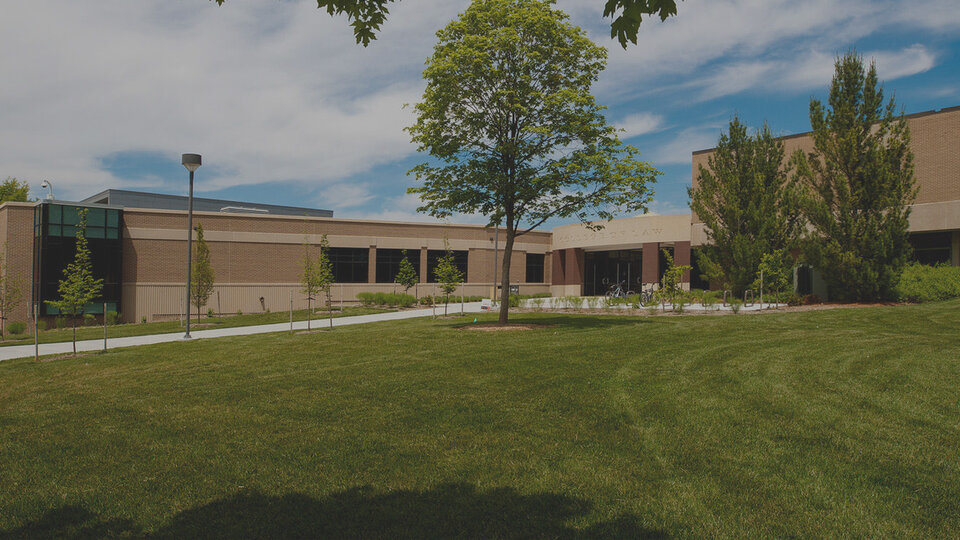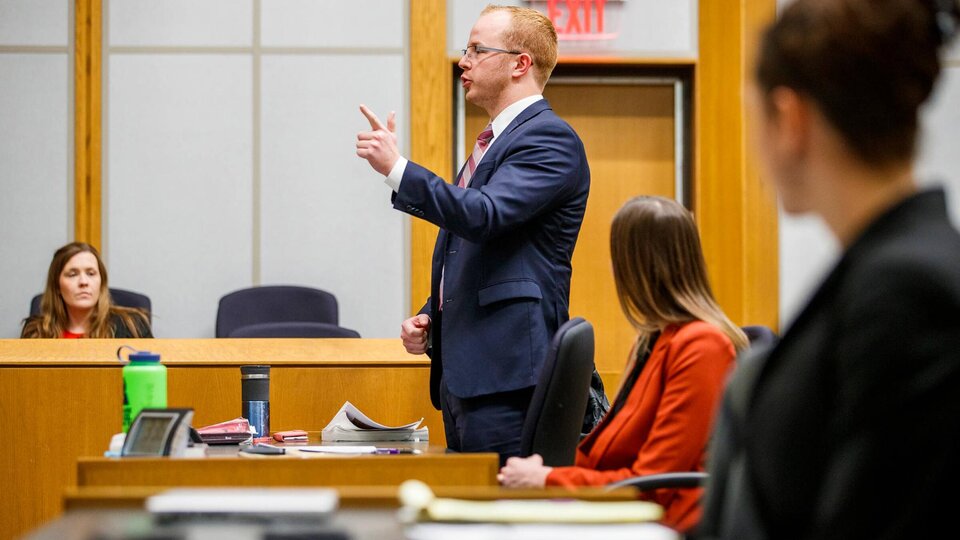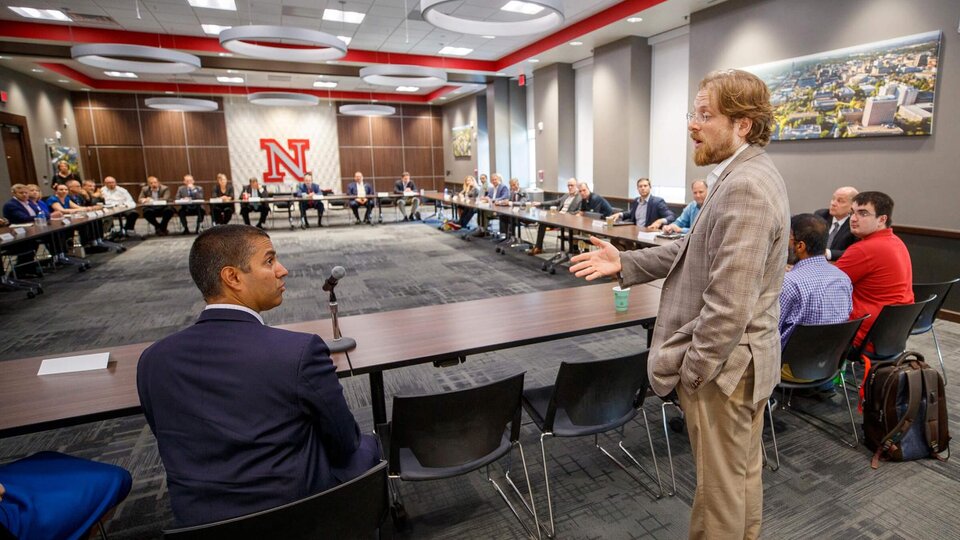We develop inclusive leaders who advance justice, solve problems, and serve with integrity.
At Nebraska Law, we:
Think Creatively
Value Diversity
Act Courageously
Listen Graciously
Build Community
Work Hard
Speak Thoughtfully
Serve Humbly
Demand Excellence
Commitments
To achieve our mission, live our values, and build upon our strengths, the Nebraska Law community is focused on three shared commitments:
Building an Inclusive & Connected Community
Preparing our Students for a Lifetime of Learning, Service, and Ethical Leadership
Solving Vital Societal Problems
The strategies below detail the means by which we fulfill these commitments as faculty, students, administrators and staff in collaboration with our alumni and key partners.
Our excellence is our people. Together, we create and foster connections within the broader University as well as local, national, and international communities, develop and promote areas of excellence, and produce well-rounded graduates to enhance Nebraska Law’s impact. To build an inclusive and connected community we will:
- Attract and retain a diverse Nebraska Law community of students, faculty, administrators, and staff committed to excellence in academics, service, and character;
- Support the personal and professional development of Nebraska Law employees;
- Foster an environment that is inclusive, cooperative, and promotes respectful professional relationships among the entire Nebraska Law community;
- Create and sustain interactions among College professionals, current students, and alumni that enrich the Nebraska Law experience for all members of our community;
- Develop and implement programming and policies designed to address well-being in the Nebraska Law community; and,
- Create new, or take advantage of existing, opportunities to connect faculty, students, administrators, staff, and alumni to the broader University of Nebraska community.
Nebraska Law provides an innovative and interdisciplinary education in a personalized environment. Our faculty is passionate about ensuring that students gain the knowledge, skills, and relationships that enable them to think critically and creatively as they address complex state, national, and international issues and advance justice. To empower our students to succeed we will:
- Ensure that every Nebraska Law graduate acquires the foundational knowledge and understanding necessary to work successfully with clients from diverse backgrounds and cultures, and to collaborate successfully with other professions and professionals;
- Maintain and strengthen our core curriculum as a crucial foundation;
- Emphasize ethics, integrity, and leadership throughout our educational program;
- Encourage and empower students to co-create their educational program through heightened connections and communication between and amongst students, advisors, faculty, alumni, practitioners, and other professionals;
- Expand, coordinate, and maximize active, including experiential, learning opportunities to make them central to a Nebraska Law education;
- Develop a coordinated program focused on encouraging and supporting students who desire to work in public service or for a public interest organization;
- Expand opportunities for students, faculty, administrators, and staff to engage in community service and pro bono representation; and
- Explore requiring substantial small-group training for all students in professional skills including client counseling, negotiation, effective communication, leadership, wellness, and technology.
Nebraska Law is committed to rigorous, relevant, creative, and diverse scholarship that reaches lawyers, leaders, scholars, and the public. Through our impactful research and service to society we advance justice and contribute to a brighter future. To confront and solve vital societal problems we will:
- Leverage our location within a major research university in the capital of an entrepreneurial and globally connected state to foster alignment between Nebraska Law research and community needs;
- Establish a national reputation for expertise and research excellence, particularly in our areas of national or international prominence, such as:
- Space, Cyber, and Telecommunications;
- Law & Psychology; and
- The Yeutter Institute of International Trade and Finance;
- Explore and evaluate the feasibility of developing new programs including Technology Governance and Law & Business that strengthen our commitment to confront and solve vital societal problems;
- Bolster the faculty’s ability to approach problems nimbly, through diverse methodologies and scholarship formats;
- Develop an internal Nebraska Law culture that emphasizes scholarship; and,
- Promote and increase the impact of our scholarship through enhanced outreach to the widest possible audience including our stakeholders and the media.
Commitments, Indicators of Success, & Implementation
Fulfilling Our Commitments
Our commitments are ambitious and critical to our future success, and to fulfill them Nebraska Law must be an efficient, adaptive, inclusive, and accessible organization with support systems that facilitate a culture of success. To fully realize these capacities we will:
- Conduct a periodic assessment and prioritization of administrative organization and support systems to promote efficiency and organizational effectiveness;
- Develop a College-wide technology plan, including funding strategies, to ensure the efficacy of our pedagogical and administrative practices;
- Evaluate on and off-campus events to ensure alignment of each activity with our mission and the effective use of our resources; and,
- Leverage resources and expertise throughout the University of Nebraska to create efficiencies and synergies wherever possible.
Key Indicators of Success
Our mission commits us to develop inclusive leaders who advance justice, solve problems, and serve with integrity. We will continually gauge our progress and our overall success in achieving this mission through focusing on key indicators of success that measure our results in meeting our three shared commitments. The Key Indicators of Success described below are broad measures; more detailed operational measures, as well as benchmarks we expect to achieve over the next five years, will be developed during the 2019-20 academic year.
Key Indicators of Success related to building an inclusive and connected community include:
- Increasing the broad diversity within our community as measured by appropriate benchmark data including ABA and similar reports relating to faculty and student diversity across significant areas;
- Enhancing inclusion in our community as measured by appropriate benchmark data that include internal climate surveys and positive results of appropriate bias and cultural competency training and similar inclusivity indicators;
- Academic excellence of our admitted students bolstered by the depth of their diversity as measured by both quantitative (students’ LSAT scores and undergraduate GPA) and qualitative data (breadth of experience and evidence of their desire to make a positive impact on society);
- The increasing quality of and participation in our professional development programs; and,
- Increasing faculty and student engagement with other University of Nebraska colleges, departments, and programs.
Key Indicators of Success related to preparing our students for a lifetime of learning, service, and ethical leadership include:
- The increasing quality and number of students engaged in active and experiential learning, community service and fellowships in public interest as measured through graduating student exit surveys, alumni surveys, and feedback from our professional community;
- The professional success for our graduates as benchmarked by our 3-year rolling bar passage rate, initial employment data, and on-going alumni success as measured through periodic surveys; and,
- The extent and quality of course offerings, including those related to professional skills such as client counseling, ethics, negotiation, effective communication, leadership, wellness, and technology.
Key Indicators of Success related to solving vital societal problems include:
- The demand from the professional, political, and academic community for Nebraska Law faculty expertise including presentations at appropriate conferences, testimony in legislative bodies, interdisciplinary collaborations within and external to the University, and successful grant applications related to significant societal issues;
- Breadth and depth of our connections to our external community as measured by broad alumni engagement and experiential learning and community service opportunities for our students; and,
- Increasingly positive research impact of our work on academic and professional communities as well as on society as a whole, measured through traditional academic measures and broader measures of the societal impact of legal research and professional scholarship.
Implementation
Each of the strategies listed under our three commitments will be prioritized and sequenced to ensure timely and effective implementation. The strategies also include related actions and operational measures to gauge progress toward implementation as well as lines of accountability identifying champions responsible for specific actions. These operational details will guide implementation in coming years. Oversight will be provided by the dean, a faculty long-range planning committee, and an administrative leadership team composed of administrators and staff. Annual reports on our plans and progress will be made to the law school community, the Dean’s Advisory Board, and University Administration.



